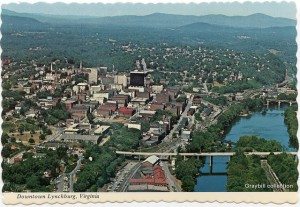What’s Passing By?
You may recall a few months ago when a rail car derailed in Lynchburg, Virginia. For good or ill, it was a small incident – small being a relative term. Three cars were destroyed, and a small amount of oil was released into the James River, where it was feared it would impact every town downstream. In the days leading up to and immediately after that, there was a derailment and spill in Pennsylvania, their second in less than a month, and a train-related disaster in Canada.
In Tidewater, local leaders came together with a series of questions. The rail line that impacted Lynchburg winds its way through Central Virginia, makes a quick stop in Richmond, and then passes Jamestown, Williamsburg, and the rest of Tidewater on its way to the docks of Hampton and Newport News. They wanted to know, what sorts of cars are they using, and what are their safety features? What sorts of materials and chemicals are the cars carrying? When and how often will these trains be passing by our homes and businesses?
The rail companies declined to respond.
While the incidents in Lynchburg and Pennsylvania were sustainable, and resulted in minimal injuries and loss of life, imagine if we had been Lac-Megantic, Quebec?
On July 6, 2013, at around 11p.m., an engineer parked the train so that the crew could change some members. Not all of the brakes on all of the cars were set, so the train – five locomotives and 72 cars – began to roll toward Lac-Megantic. It arrived in town at around 1:15a.m., where 63 cars derailed, and a massive fire began. Cars began to explode, incinerating everything within a kilometer of the tracks. Over half the town was destroyed, and 47 people lost their lives.
In the tiny town of West, Texas, West Fertilizer Company had supplied local farmers with chemicals for over 50 years. It was cited numerous times for improper storage of anhydrous ammonia, a fertilizer ingredient, and improper respiratory protections. It was cited again for having two tanks of the chemical, for which they had no permit. The EPA fined them for failing to file a risk management plan for their explosive chemical. In total, Federal and Texas authorities cited or fined the company almost a dozen times.
On April 17 of last year, the plant caught fire. Local firefighters responded, and as they worked to contain the blaze, the facility exploded. The plant was obliterated, as was a 50-unit apartment complex, a nursing home, and the local middle school. 15 were killed, and 160 were injured. Investigators have ruled out weather, natural causes, or the chemicals themselves as possible causes of the fire.
People around West were understandably curious and perturbed about such highly explosive compounds hanging around their neighborhood. If they were in any danger, didn’t they have a right to know? The Texas Attorney General agreed. He thought it important that “every single person in the state of Texas will have access to information stored in any plant in their neighborhood.” Great, right? Well, how would Texans get this information?
Simply drive up to the plant and ask them.
Shouldn’t the state or Federal government have access to that and be able to warn us? No. They’re protecting you.
Fine people in Canada lost their lives, as did first responders in Texas. People all over North America, each and every day, are breathing in dangerous chemicals. It’s running through our water, passing by our homes, entering our food cycles, and we often have no idea it’s there.
Isn’t it time for a bit of transparency?
